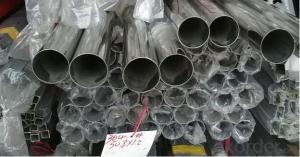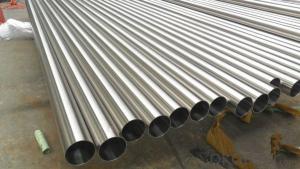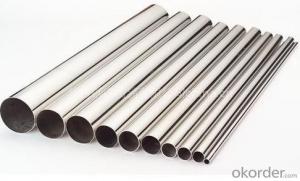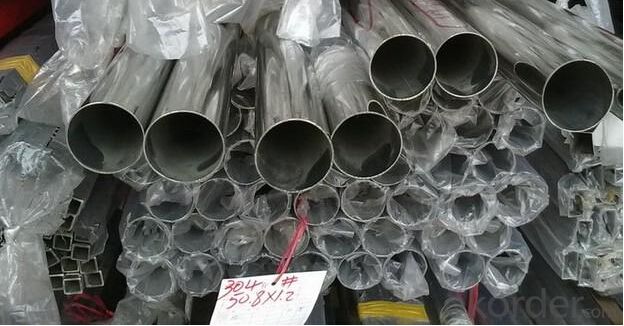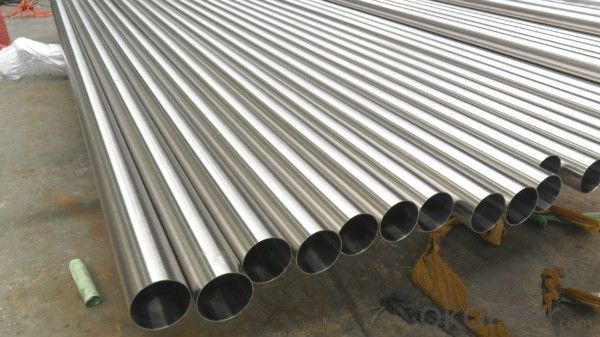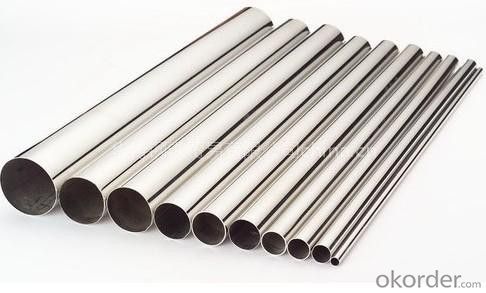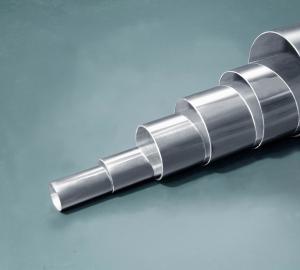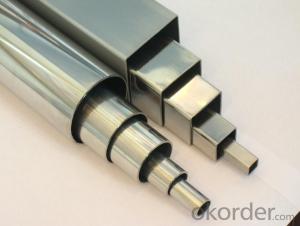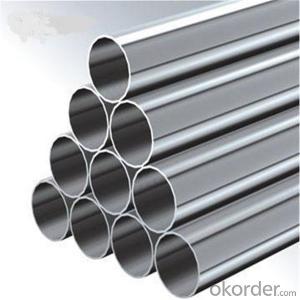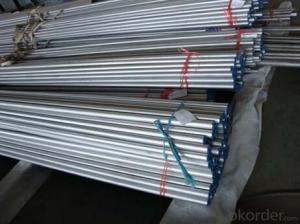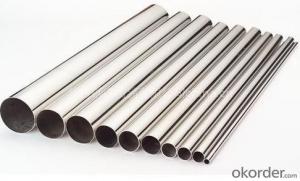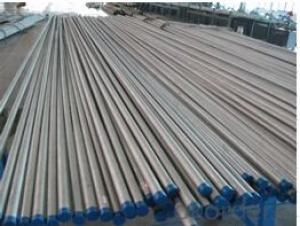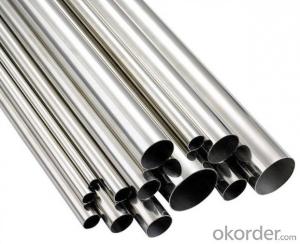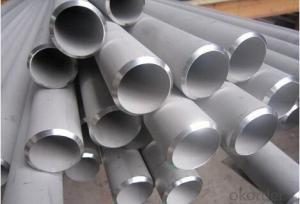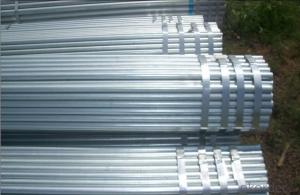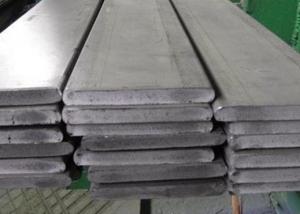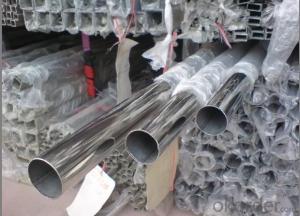Boiler Heat Exchange Stainless Steel Pipe 2205 ASTM A213
- Loading Port:
- Ningbo
- Payment Terms:
- TT or LC
- Min Order Qty:
- 25 m.t.
- Supply Capability:
- 7000 m.t./month
OKorder Service Pledge
OKorder Financial Service
You Might Also Like
1、Structure of Boiler Heat Exchange Stainless Steel Pipe 2205 ASTM A213:
Boiler Heat Exchange Stainless Steel Pipe 2205 ASTM A213 is formed by drawing a solid billet over a piercing rod to create the hollow shell. As the manufacturing process does not include any welding, Boiler Heat Exchange Stainless Steel Pipe 2205 ASTM A213 are perceived to be stronger and more reliable. Historically Boiler Heat Exchange Stainless Steel Pipe 2205 ASTM A213 was regarded as withstanding pressure better than other types, and was often more easily available than welded pipe.
2、Main Features of Boiler Heat Exchange Stainless Steel Pipe 2205 ASTM A213:
• High manufacturing accuracy
• High strength
• Small inertia resistance
• Strong heat dissipation ability
• Good visual effect
• Reasonable price
3、Boiler Heat Exchange Stainless Steel Pipe 2205 ASTM A213 Specification:
Standard | GB, DIN, ASTM ASTM A106-2006, ASTM A53-2007 |
Grade | 10#-45#, 16Mn 10#, 20#, 45#, 16Mn |
Thickness | 8 - 33 mm |
Section Shape | Round |
Outer Diameter | 133 - 219 mm |
Place of Origin | Shandong, China (Mainland) |
Secondary Or Not | Non-secondary |
Application | Hydraulic Pipe |
Technique | Cold Drawn |
Certification | API |
Surface Treatment | factory state or painted black |
Special Pipe | API Pipe |
Alloy Or Not | Non-alloy |
Length | 5-12M |
Outer Diameter | 21.3-610mm |
Grade | 20#, 45#, Q345, API J55, API K55, API L80, API N80, API P110, A53B |
Standard | ASME, ASTM |
1) Material:20#(ASTM A 106/A53 GRB.API5LGRB,GB),45#,16Mn,10#.
2) Specification range:OD:21.3-610mm,WT:6-70mm,length:6-12m or according to the requirement of clients.
3) Excutive standards:GB,ASME API5L.ASTM A 106/A53,Despite of the above standards,we can also supply seamless steel pipe with standard of DIN,JIS,and so on,and also develop new products according to the requirements of our clients!
4) Surface:black lacquered,varnish coating or galvanized.
5) Ends:Beveled or square cut,plastic capped,painted.
6) Packing:bundles wrapped with strong steel strip,seaworthy packing.
4、Packaging & Delivery
Packaging Details: | seaworthy package,bundles wrapped with strong steel strip |
Delivery Detail: | 15-30days after received 30%TT |
5、FAQ of Boiler Heat Exchange Stainless Steel Pipe 2205 ASTM A213:
①How is the quality of your products?
Our products are manufactured strictly according to national and internaional standard, and we take a test
on every pipe before delivered out. If you want see our quality certifications and all kinds of testing report, please just ask us for it.
Guaranteed: If products’ quality don’t accord to discription as we give or the promise before you place order, we promise 100% refund.
②How about price?
Yes, we are factory and be able to give you lowest price below market one, and we have a policy that “ for saving time and absolutely honest business attitude, we quote as lowest as possible for any customer, and discount can be given according to quantity”,if you like bargain and factory price is not low enough as you think, just don’t waste your time.Please trust the quotation we would give you, it is professional one.
③Why should you chose us?
Chose happens because of quality, then price, We can give you both.Additionally, we can also offer professional products inquiry, products knowledge train(for agents), smooth goods delivery, exellent customer solution proposals.Our service formula: good quality+good price+good service=customer’s trust
SGS test is available, customer inspection before shipping is welcome, third party inspection is no problem.
6、Seamless Pipe ASTM A106/53 Images:
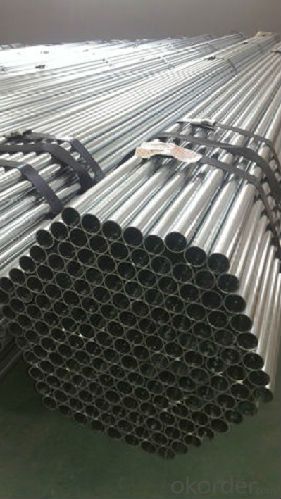
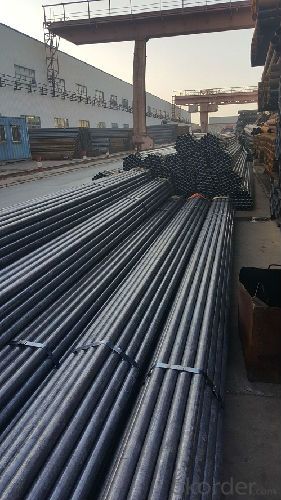
- Q: Can stainless steel pipes be used for oil refineries?
- Yes, stainless steel pipes can be used for oil refineries. Stainless steel is a highly durable and corrosion-resistant material, making it suitable for handling various chemicals and high-temperature environments found in oil refineries. Additionally, stainless steel's strength and reliability make it a preferred choice for transporting and processing petroleum products.
- Q: Are stainless steel pipes suitable for air conditioning systems?
- Yes, stainless steel pipes are suitable for air conditioning systems. Stainless steel is highly resistant to corrosion, which makes it an ideal material for air conditioning systems where moisture and condensation can occur. It is also strong, durable, and can withstand high temperatures, making it suitable for the harsh conditions typically found in air conditioning systems. Additionally, stainless steel pipes have a smooth inner surface, which helps to minimize friction and improve the flow of air. Overall, stainless steel pipes provide excellent performance and reliability in air conditioning systems.
- Q: What are the weight limitations for stainless steel pipes?
- The weight limitations for stainless steel pipes vary depending on several factors such as the grade of stainless steel, the pipe's dimensions, and the intended application. However, stainless steel pipes are known for their strength and durability, which allows them to withstand heavy loads. Generally, stainless steel pipes can support significant weight without deformation or failure. It is important to consult the manufacturer's specifications or engineering standards for precise weight limitations as they can provide the most accurate information specific to the particular type and size of stainless steel pipe being used.
- Q: Can stainless steel pipes be used in underground installations?
- Yes, stainless steel pipes can be used in underground installations. Stainless steel is a highly durable and corrosion-resistant material, making it suitable for underground applications where the pipes are exposed to moisture and other environmental factors. Additionally, stainless steel pipes have high strength and can withstand pressure, making them a reliable choice for underground installations.
- Q: Can stainless steel pipes be used for dairy processing equipment?
- Yes, stainless steel pipes can be used for dairy processing equipment. Stainless steel is a commonly used material in the food and dairy industry due to its hygienic properties, resistance to corrosion, and ease of cleaning. It is specifically designed to meet the high standards of cleanliness and sanitation required in dairy processing, making it a suitable choice for various applications in this industry.
- Q: What wire is used for welding of 316 stainless steel line?
- Inspection of assembly and tack welds;1, check the geometry and shape after assembly, whether it conforms to the provisions of the drawings. :2, assembly and assembly clearance is 1.5 - 2mm, using TIG welding, three point positioning welding,The welding seam position for the clock 3 points, 9 points and 12 points, the welding materials used should be the same as the welding materials, welding length is 10 15mm, welding requirements and guarantee no defect, the wrong side is less than 1.5 2mm.3, the group is not allowed to use strong assembly, the joint wall must be flush.4, when welding, there must be no air, slag, tungsten and crack.
- Q: What is the difference between 304J6 and 316J6 stainless steel pipes?
- The main difference between 304J6 and 316J6 stainless steel pipes lies in their composition and properties. 304J6 stainless steel is a low carbon variation of the popular 304 stainless steel. It contains around 18% chromium and 8% nickel, which provides excellent corrosion resistance and durability. This grade is commonly used in various applications, including food processing, chemical processing, and architectural purposes. On the other hand, 316J6 stainless steel is an austenitic stainless steel grade known for its higher corrosion resistance compared to 304J6. It contains around 16-18% chromium, 10-14% nickel, and 2-3% molybdenum. The addition of molybdenum enhances its resistance to pitting and crevice corrosion in chloride environments, making it suitable for marine and coastal applications. In terms of mechanical properties, both grades offer good strength and toughness. However, 316J6 stainless steel typically has higher tensile strength and hardness due to its alloy composition. When it comes to price, 316J6 stainless steel pipes are generally more expensive than 304J6 due to the higher cost of molybdenum. Therefore, the choice between the two grades depends on the specific requirements of the application and the level of corrosion resistance needed.
- Q: Are stainless steel pipes suitable for brewing systems?
- Yes, stainless steel pipes are highly suitable for brewing systems. Stainless steel is corrosion-resistant, non-reactive, and easy to clean, making it an ideal material for handling various brewing processes, including transporting water, wort, and beer. It helps maintain the purity and quality of the brew, ensuring there are no off-flavors or contaminants introduced during the process. Additionally, stainless steel pipes are durable and can withstand high temperatures and pressure, making them a reliable choice for brewing systems.
- Q: Are stainless steel pipes resistant to chemicals?
- Yes, stainless steel pipes are generally resistant to chemicals. Stainless steel is known for its corrosion resistance properties, which makes it an ideal material for various applications, including pipes that are exposed to different chemicals. The high levels of chromium in stainless steel create a protective layer on the surface of the material, preventing it from reacting with most chemicals and corrosive substances. However, it is important to note that the resistance of stainless steel pipes to chemicals can vary depending on the specific type and grade of stainless steel used. In some cases, certain aggressive chemicals or extreme conditions may still cause corrosion or damage to stainless steel pipes, so it is always advisable to consult with experts or refer to specific chemical resistance charts for accurate information on the compatibility of stainless steel pipes with different chemicals.
- Q: What are the cost considerations for stainless steel pipes?
- The cost considerations for stainless steel pipes include the initial purchase price, installation costs, maintenance expenses, and potential long-term savings due to their durability and corrosion resistance. Additionally, factors such as the grade, size, and quantity of pipes needed and any additional fabrication or customization requirements can also impact the overall cost.
Send your message to us
Boiler Heat Exchange Stainless Steel Pipe 2205 ASTM A213
- Loading Port:
- Ningbo
- Payment Terms:
- TT or LC
- Min Order Qty:
- 25 m.t.
- Supply Capability:
- 7000 m.t./month
OKorder Service Pledge
OKorder Financial Service
Similar products
Hot products
Hot Searches
Related keywords
